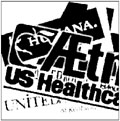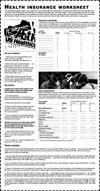By Pat Ford
Pew Center
 It was a battle of the Titans: Aetna-U.S. Healthcare, the giant national insurer, vs. The Physicians Inc. (TPI), a group of 1,800 doctors — the majority of doctors practicing in the Louisville area. The details were Byzantine but the impact was simple: Thousands of Aetna policyholders, though not part of the dispute, would bear the consequences. They would no longer be covered for visits to their doctors.
It was a battle of the Titans: Aetna-U.S. Healthcare, the giant national insurer, vs. The Physicians Inc. (TPI), a group of 1,800 doctors — the majority of doctors practicing in the Louisville area. The details were Byzantine but the impact was simple: Thousands of Aetna policyholders, though not part of the dispute, would bear the consequences. They would no longer be covered for visits to their doctors.
Enter The Courier-Journal in the role of Greek chorus, trying to provide perspective that would help people decide what to make of the dispute.
“What we had was a situation where people were extraordinarily confused about what was going on,” says Courier-Journal Metro Editor Chuck Clark. “We decided to come up with a way to empower people to figure out this maze for themselves.”
So the paper came up with a Health Insurance Worksheet, a series of questions for readers to ask their employers and doctors and a form on which to record the answers so readers could compare various health insurance plans and their costs and benefits.
Many readers found it helpful, according to Clark and employees of the Kentucky Department of Insurance. But Aetna was “livid,” says spokeswoman Wendy Morphew. “We considered it unethical. It looked like they were trying to steer their readers into ways to leave Aetna.”
Making sense of the problem
The dispute began in the late spring 1999, when Aetna could not reach an agreement with TPI, an independent practice association that negotiates for its 1,800 members as a group. Confusion ensued when TPI members began telling patients they would no longer accept Aetna, while Aetna insisted they would. It became clear to The Courier-Journal that people were going to have to decide for themselves whether they were going to have to change doctors or change insurance companies. Since many people are insured through their employers, that meant traversing an array of options.
“If you’ve ever sat down in one of those human resources meetings with an a la carte menu of insurance options in front of you, it’s confusing under the best of circumstances,” says Clark. “Suddenly, nearly 200,000 people were confronted with this decision.”
So reporter Dick Kaukus started interviewing insurance specialists about what people would need to know to make a decision. “We tried to think it through in a logical step by step approach,” says Kaukus. Thus, Aetna policy holders were advised to ask their doctors, first: Will you continue to accept Aetna? Then, what other insurance do you accept? Then, do you expect to continue to accept this insurance for the next 12 months?
 “We were impressed with how methodical and thorough Dick Kaukus was,” says Roger Snell, communications director for the Kentucky Department of Insurance. “It was very complicated and he made such a great effort and went into great detail.”
“We were impressed with how methodical and thorough Dick Kaukus was,” says Roger Snell, communications director for the Kentucky Department of Insurance. “It was very complicated and he made such a great effort and went into great detail.”
The form reflected Insurance Department research that shows people’s primary criteria for choosing insurance is whether their doctor accepts it and that cost is the second criteria. The form first suggested listing all of a family’s doctors and specialists and provided several columns to check off what insurance each accepts.
Below was a form that listed all the medical services insurance policies typically cover with columns to list co-payments, deductibles, payroll deductions and other factors that contribute to the cost.
Information or Advocacy?
Paul Jennings, chief executive of TPI, says he believes patients found the checklist helpful. “The newspaper went to great lengths to make sense of this for people and it deserves a lot of credit,” says Jennings. “It didn’t always print everything favorable to us but it was helpful and accurate.”
Aetna, on the other hand, felt very strongly that the form promoted changing insurance companies. “There was a significant reporting of facts,” says Dr. David T. Allen, Aetna’s Medical Director. “But it also seems as though there was advocacy of the position that, yes, you should change your health insurance company.”
Dr. Allen cites a portion of the form called “Points to Consider,” where the paper uses the phrases, “you should consider switching,” and “you will want to see if there’s a way to keep that doctor, perhaps by switching insurance companies if necessary.”
The wording, says Dr. Allen, “does significant harm” to Aetna’s efforts to keep its policyholders.
Kaukus says he was simply responding to the readers’ need for information and not taking a position. He says he consulted neither Aetna nor TPI about the wording on the form because he wanted to consult sources that were neutral on the matter. “I didn’t check with Aetna or TPI because I thought they’d be looking at it from their own point of view and it would be difficult for them to be detached. Even if they were detached, there would be a question of their credibility so we decided consciously not to talk to them about any of it. Neither had a role in framing the questions.”
Snell, of the Insurance Department, which was consulted on the wording, expressed surprise at Aetna’s complaint. “We didn’t see it that way,” says Snell. “We tried to stay neutral. We just wanted consumers to know their options and have time to make a decision. And that might mean switching.”
Kaukus says readers apparently felt it was helpful because he received a couple of requests to run the form when another big benefits enrollment period arrived at several large Louisville employers.
His editor, Clark is proud of the effort. “The best thing a newspaper can do,” says Clark, “is help people figure out how to make important decisions. In an election, the newspaper gives people tools to make wise decisions. This time, the decision involved their private lives. That’s part of our job, too.”
